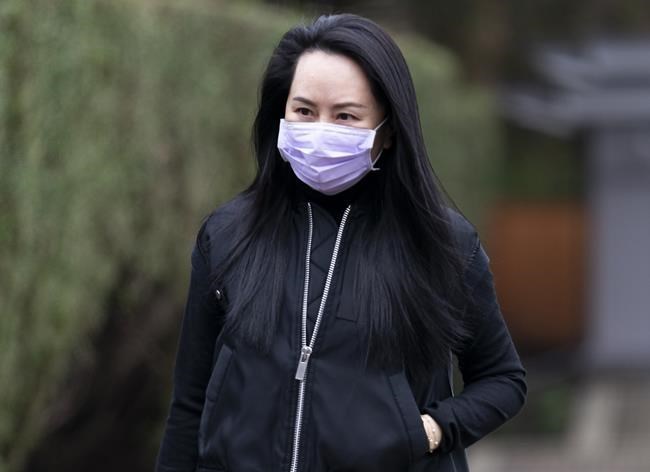VANCOUVER — Canada's attorney general says the failure of former U.S. president Donald Trump to win re-election nullifies an argument to release Huawei executive Meng Wanzhou on the basis he was using her to get a better trade deal with China.
In court documents released Thursday, the attorney general says Meng's argument depends on public statements that were made by a president who is no longer in office about a possible intervention in the case that never occurred, purportedly to achieve a Chinese trade deal that has long since been successfully negotiated.
"The changes in circumstances since the comments were made and this application was filed have served to remove the factual underpinning for the applicant’s arguments," the written argument says.
The B.C. Supreme Court will hear claims from Meng's lawyers in March alleging an abuse of process over Trump's public comments about the case, which they have said show that she was being used as a political bargaining chip.
The document says those facts now have no past, present or prospective impact on the proceedings.
Even if the argument isn't nullified by the U.S. election, the attorney general's document says the application should fail because the statements by the former president do not amount to misconduct.
Meng is facing extradition to the United States on fraud charges that both she and Huawei deny. She is accused of making misleading representations to HSBC, putting the bank at risk of violating U.S. sanctions against Iran.
In Vancouver, where Meng remains on bail following her 2018 arrest, her lawyers will argue in court that she suffered several abuses of process and Trump's comments are only one example. If any abuse is proven, the lawyers say proceedings should be stayed against their client.
The application filed by Meng’s lawyers in July accused Trump of “poisoning” the extradition by using Meng’s case to further his trade negotiations with China.
They pointed to comments Trump made to the media, such as an interview with Reuters days after Meng’s arrest at Vancouver's airport.
“If I think it’s good for what will be the largest trade deal ever made — which is a very important thing — what’s good for national security — I would certainly intervene if I thought it was necessary,” Trump said, when asked if he would intervene with the U.S. Justice Department in her case.
But lawyers for the attorney general suggest Meng’s team is depending on a “highly selective factual record” and exaggerating the supposed impacts.
Trump’s comments are inconsistent with statements made by other knowledgeable government officials, such as the acting attorney general, secretary of state and lead negotiator on U.S. trade talks with China, the court documents say.
Trump's comments involve no threat, but at best the “windfall” of the termination of her case to facilitate a trade deal, they say.
There is also no evidence the charges were politically motivated or that Trump’s statements have had any affect on the fairness of the extradition hearing.
The test for an abuse of process is a rigorous one, and Meng’s lawyers haven’t met it, the attorney general says.
This report by The Canadian Press was first published Feb. 21, 2021.
Amy Smart, The Canadian Press



